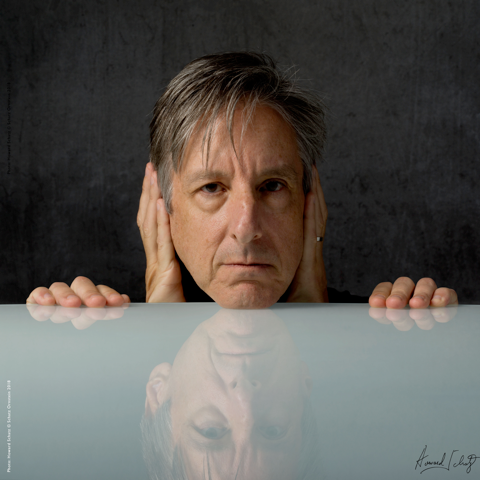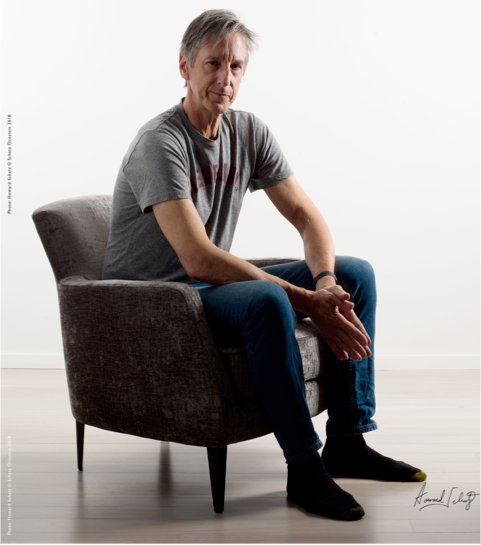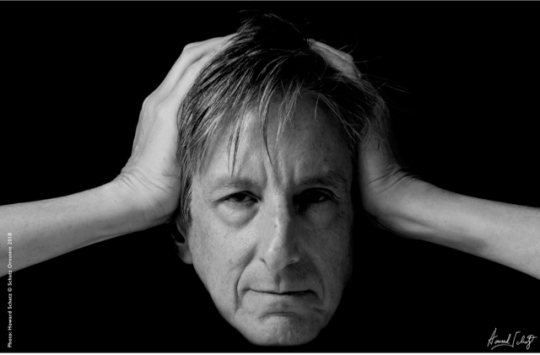
A few weeks ago, the New Yorker Magazine humorist, Andy Borowitz, came
to the studio to partake in my project: “ABOVE and BEYOND; photographic
portraiture and video interviews of extraordinary people in our time.”
Visualizing verbal humor is not easy, but Borowitz turned out to be an amazing portrait and interview subject.
A favorite of New Yorker
readers in print and online, Borowitz is a New York Times-bestselling
author who won the first National Press Club award for humor. He is
known for creating the NBC sitcom, “The Fresh Prince of Bel-Air” and the
satirical column “The Borowitz Report.” In a profile on CBS News Sunday
Morning, he was called “one of the funniest people in America.”
In 1980, Borowitz graduated Magna Cum Laude from Harvard College, where he was president of the Harvard Lampoon Humor Magazine.
In 2011, Library of America chose Borowitz to edit an anthology of
American humor entitled, “The 50 Funniest American Writers.”
Encompassing American humor writing from Mark Twain to The Onion, the
book was released on October 13, 2011, and became a bestseller on the
day of its publication. It reached number eight on Amazon, and became
the number-one humor book in the United States. Both Barnes & Noble
and Amazon named it a Best Book of 2011, and Amazon also named it the
number-one Entertainment Book of the Year.
Since 1999, Borowitz has been the primary host of The Moth, a New York-based storytelling group.
On July 18, 2012, Borowitz announced that The New Yorker had acquired
the Borowitz Report website; the first time that the magazine had ever
made such an acquisition.

Here are excerpts from our interview:
HS: Regarding your process as a humorist and
satirist, is it inspired by reading the news in search for irony, or do
ideas just come to you?
AB: I’m not a news junkie. I’m just aware of
what the few top stories of the day might be. I go to Google News to see
what things are being most widely covered. But I don’t really sit down
at a desk and say, okay, how can I turn this into something?
I just go about my day. I take my daughter to school, I pick her up on
certain days. I make dinner, I go grocery shopping. I exercise. I just
sort of live my life and sooner or later an idea will pop into my head
and I’ll work with it.
If I could turn it into more of a process and more of a science I would
gladly do it, because it would be less nerve wracking. But I don’t need
inspiration. I am a working writer, I do what I do most days a week. It
is a little bit of an anti-process. It relies on a certain amount of
spontaneity.
I am on the whole an improv performer, both live and in writing. I
almost never work at a desk either. I’ll go to the park. I write on my
phone. I’ve figured out a genre of writing that’s so short that I can
write on my phone. That wasn’t the idea behind it. I sort of waited for
that technology to catch up with it.
I’m a runner. So if I’m going for a run around the park, and I have an
idea for a headline, and it’s something very topical, something that’s
happened that day, I sit down on a bench, and start writing.
Maybe half an hour later the piece is done and it’s sent to the New
Yorker, and it’s online in another half hour. The way we’re absorbing or
consuming news, even satirical news, it’s so much of the moment, and
it’s so ephemeral now that in a way winging it and being able to do
something quickly really counts for a lot. Because by tomorrow people
aren’t going to care anymore. They’re onto something else.

HS: Do you care about what your editor does to your piece?
AB: I had one experience which I love, which
was right after Trump was elected. The first few columns I tried to
publish in the New Yorker were really angry. They were reflecting my
mood and I think probably a mood shared by many people who read my
column. But unfortunately the way I expressed it in a lot of these
columns, I was very disdainful, and sort of contemptuous of the people
who had voted for Trump.
And my editor said “You know, we can’t just run all of these pieces
where you’re attacking Trump supporters.” And I asked why not? And he
said, “We don’t want the New Yorker to appear elitist.” And I thought,
well you know, I think once a magazine has decided that its mascot will
wear a top hat and a monocle, I think the ship has kind of sailed…I
thought it was really funny because I have no problem with defining
myself as an elitist. To me, elitism means that I expect and want a
president who’s smarter than I am.
Since the Trump election I’ve actually doubled-down on elitism. I think
it’s a missing element in our cultural conversation that we need to
reintroduce. People are ashamed to be smart and ashamed to be
well-educated. And they’re trying to show that they’re the salt of the
earth.
HS: Can being funny be taught? Can you take somebody who has
never been a comedian and help them become one? Or can you take somebody
who is a comedian and make them better?
AB: I think a funny person can be taught to
write better or to perform better. And like any kind of art form, you
get better with practice and you get better with instruction. I don’t
think if somebody’s just not funny, you can’t…There are all these
comedy classes where they’re like trying to teach you how to be funny,
and I think that’s a huge waste of time.
David Sedaris had a great line I loved, he said, “there’s all this talk
about how tough comedy is and how hard comedy is,” and he said, “comedy
is really hard unless you’re funny.” And that is true. It’s like
anything.

HS: How did you get to this point in your life?
AB: I started in television right out of
college. And partially because my father was a lawyer and worked at the
same job for like 40 years, I thought, and I’m going to be doing this
into my 60s. I’m just going to be going to be going into the office
every day and writing TV scripts. And it never occurred to me that my
life might take different turns. But by the time I’d been writing for
television for about ten years I just thought to myself, is this really
the way I want to spend the rest of my life?
Because to me it was so collaborative, a group of people sitting around a
writer’s room pitching jokes, and pitching ideas. And there’s sometimes
brilliant results from that but I had a very old fashioned view of what
a writer did. And to me a writer was still one person, alone, writing.
And so, after about 15 years I was like, let me just take some time off
and do nothing. And I did for a couple of years, I just didn’t write at
all. I really didn’t have any sort of plan. Then what happened was a
return to my roots which was writing for the Harvard Lampoon, and
writing news satire. And I started writing prose for the New Yorker. I
started up the Borowitz Report in around 2001. And suddenly I felt much
more creative and I was much more fertile than I’d been, say, as a TV
writer.
HS: Do you think writing for the New Yorker is sort of preaching to the choir?
AB: One hundred percent. I think preaching to the choir has tremendous value. I do.
HS: Because?
AB: Because the choir needs to be energized
to make things better. I’m not trying to change a single person’s mind.
Not at all. I just want more people who already agree with me to vote. I
think people underestimate just how difficult it is to change anyone’s
mind.
HS: The Trump voters have not changed their minds, despite all that’s gone on.

AB: They would say the same is true of us, and
that’s fine. My feeling, though, is that if my choir is incapable of
voting, of getting people to register to vote, canvasing in swing
states, writing a check to the ACLU, all those important things that my
choir should be doing, my preaching to the choir actually has tremendous
value because if they laugh, and then their serotonin level momentarily
rises, maybe they’ll write that check. So yes, I am doubling down on
elitism and preaching to the choir. One hundred percent.
